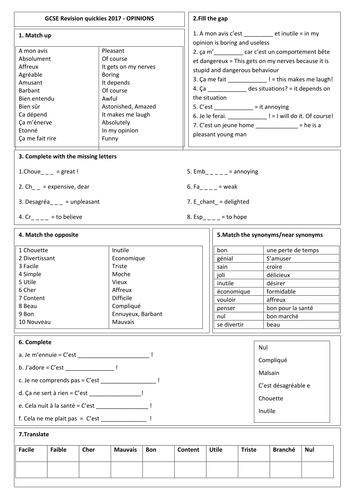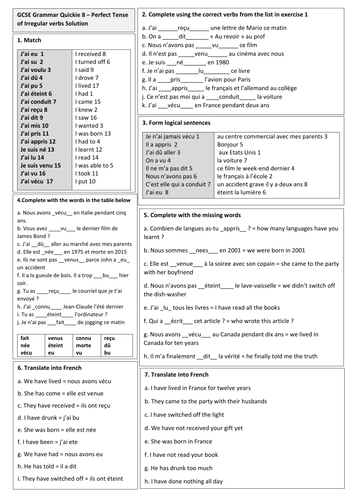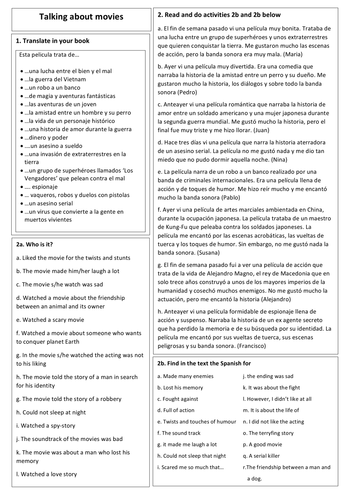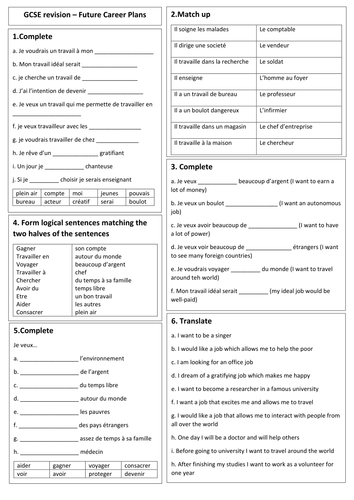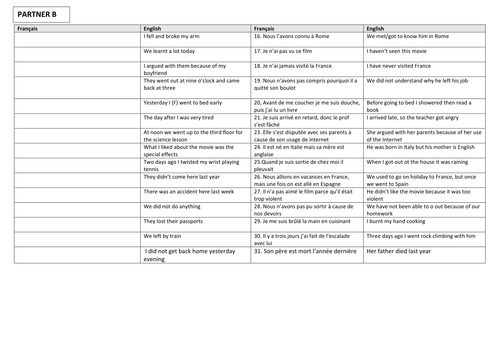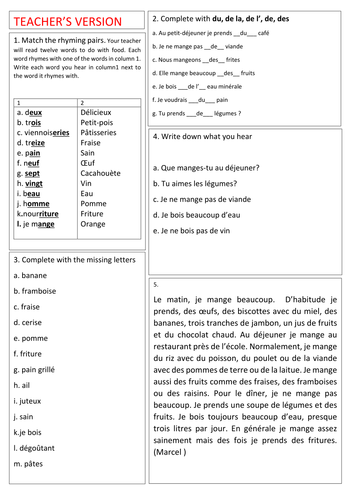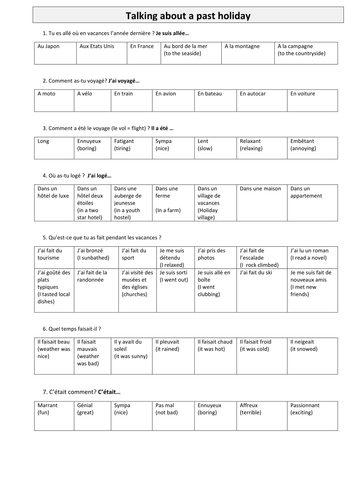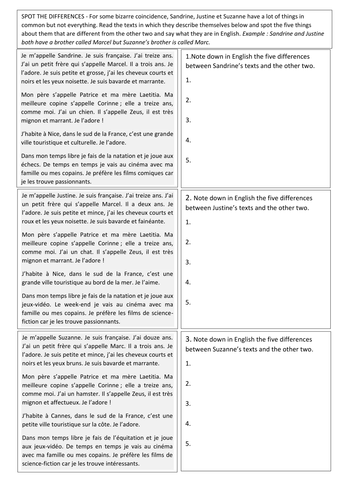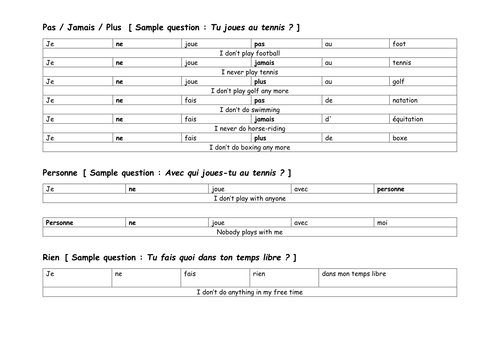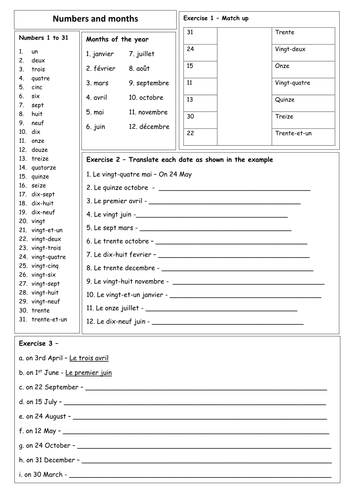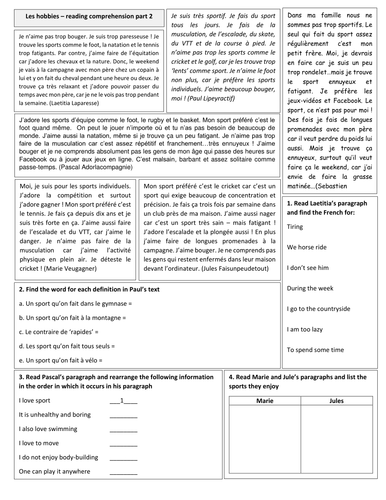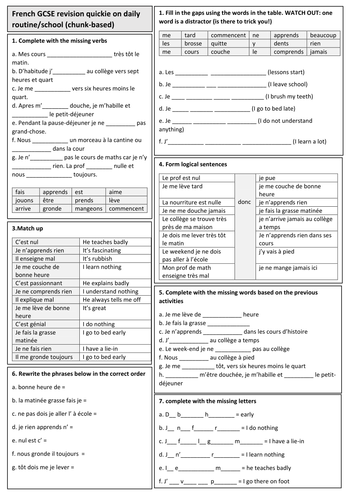
383Uploads
3148k+Views
5746k+Downloads
French

20 NEW French GCSE revision quickies ( 2017 edition) with solutions provided
Content is based on AQA specification core vocabulary plus other useful vocabulary to stretch students - Solution is provided on same or separate sheet
Time markers
Opinions
School x 2
Food
Jobs and career
Home, town and neighbourhood
Environment x 2
Negatives x 2
Present of irregular verbs x 2
Reflexive verbs
Prepositions
Connectives

GCSE French Grammar Revision quickie 1 - Present of high-frequency irregular verbs (with solutions)
A consolidation sheet packed with activities designed to recycle the present form of the main irregular verbs to death.

GCSE French Grammar Revision Quickies with solutions
A range of consolidation worksheets packed with activities drilling in key grammar points

GCSE Grammar revision quickie with SOLUTION on PERFECT TENSE in the context of SCHOOL LIFE
Consolidation sheet with answer key

GCSE FRENCH REVISION - Narrow reading on school with pre-reading activity
Five texts recycling key vocabulary + comprehension questions. I use them for listening comprehension, too
Pre-reading activity drumming in vocabulary in narrow reading texts is also included.

KS4 Spanish - Talking about movies (reading comp)
A list of useful phrases for talking about films and short narrow reading texts for comprehension.

GCSE French - Narrow reading tasks on health
6 narrow reading texts a la Conti with a set of seven tasks to exploit them as much as possible . The texts recyle very similar vocabulary to death whilst providing useful model phrases/sentences including some handy idioms. I have used it successfully with my students and they were fully engaged.

KS3/4 French - Sentence builder to introduce comparatives
A sentence builder to introduce the comparatives.

GCSE revision - Oral ping-pong translation__perfect tense
Another oral ping-pong translation
INSTRUCTIONS - The students work in pairs. They have a sheet with the same English sentences to translate into French, but Partner A has the translation of sentences 1 to10, whereas Partner B has the translation of sentences 11 to 20.
I call it 'Oral ping-pong translation' because they do it orally, Partner A challenging Partner B with a sentence and showing the correct answer to provide them with feedback and to award points (3 for perfect sentence, 2 for one mistake only, 1 if there are mistakes but at least the verb is correctly formed). I give them a time limit (10 minutes); when the time is up the person with the higher score wins. Best to have people of similar ability in each pair. Here is an example: I made for a very able year 11 of mine. Obviously the activity can be done in writing too.
As a follow-up, I get the students to make a note of the most serious mistakes they made in their books so that I have an idea of what their problem areas are. Differentiation opportunities are obvious: different sets of sheets for groups of different ability

2017 KS3 French resources - Food (lstening, speaking, reading and translation)
New pool of resources on food, twelve to be exact

KS3/4 French - Holidays (sentence builder, narrow reading, oral scaffold, vocab builder,etc.)
Listening-as-modelling (sentence builder), Speaking, Reading and Vocab building activities

Year 7 / 8 French - Oral board game on high-frequency school-related phrases
Instructions: In groups of three students (2 player + 1 referee) or five (2 teams of two players and one referee), players take turn in casting the dice. Whichever case the player/team reach based on their dice score, they will have 30 seconds to translate the relative sentence(s) into French orally. The referee will then tell the players (with the help of the answer sheet) if their translation is correct. If the translation is correct they will have another go and casting the dice and will advance to the next case where they will have to translate the next sentence and so on. However, if their translation isn’t correct, the referee will read to them the right version twice in order for the players to attempt to memorize it for the next round when they will have another go. After the opponents’ turn the player will have another chance at casting the dice; if they answer the question they originally got wrong correct. The person who is closer to the finishing line ten minutes into the game will win.

Year 7/8 French - Narrow reading tasks on general description
Three narrow reading texts exploited through 4 different narrow reading tasks

Year 7/8 French - Scaffold for ILRs (Implicit Learning Routines)
Scaffolding sheets to use in support of the following daily ILRs
- Register routine to elicit use of expressions indicating emotional states or feelings
- Small talk about what one did yesterday, last weekend, etc.
- Exit ticket routine at end of lesson : what are you going to do this eve, tomorrow, weekend, etc.
- Grumpy time routine (teacher ask questions and students must answer always in the negative usin different negative structures each time)

KS2/3 French - Seven resources on numbers, dates and birthdays
A set of resources on numbers, dates and birthdays

GCSE French revision - Complex-structures practice in context: Holiday and travel
Two sheets of activities practising the use of relatives, apres + past infinitive + imperfect vs perfect tense, irregular adjectives and other structures in the context of holidays.
The first in a series of worksheets aiming to recycle key structures over and over again across a wide range of topics and linguistic contexts

12 new (chunk-based) French GCSE revision quickies (2018)
TOPICS; daily routine, school, health and lifestyle, family relationships and my 'universals'
Research shows clearly that teaching vocabulary through patterns and collocations is a much more effective way than teaching single words. Although I have always endeavoured to teach words in context and phrases, this collection of quickies is more au fait with current vocab research.
As a result, here is a new set of GCSE revision quickies that are chunk-based and focus on collocation and lexical priming. These new quickies complement the ones I have previously created beautifully in my opinion.
Why you should use them: they reflect the way humans learn languages - through chunks and lexical patterns rather than single words. So the focus here is on developing a repertoire of ready-to-use phrases recycled over and over again.

KS3/4 French - Perfect tense of verbs in Etre (pool of resources)
A sentence builder, communicative drills, pre-communicative drills and narrow reading texts

